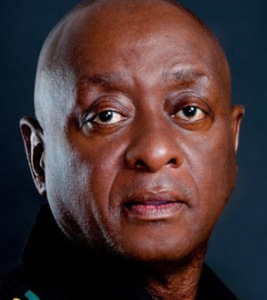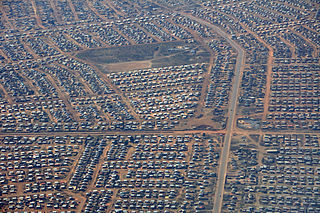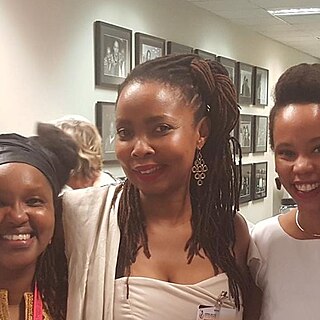Related Research Articles
Leleti Khumalo is a South African actress known for her leading role in the movie and stage play Sarafina! and for her roles in other films such as Hotel Rwanda, Yesterday and Invictus, as well as the soap opera Imbewu: The Seed where she plays Nokubonga "MaZulu" Bhengu and on Uzalo as MaNzuza.

Jonathan Paul Clegg, was a South African musician, singer-songwriter, dancer, anthropologist and anti-apartheid activist.
PJ Powers is a South African singer and performer. She became a household name in southern Africa after the widespread success of the song “Jabulani”. When she played at the Jabulani Amphitheatre in 1983 she was hailed by the crowd with the name “Thandeka”. On the stage she drank from a calabash as part of the performance to the delight of the audience. World in Union 95, the Ladysmith Black Mambazo version featuring PJ Powers, became an international hit record in 1995. It reached no. 47 in the UK singles charts.

Mbongeni Ngema was a South African playwright, lyricist, composer, director, choreographer, and theatre producer, best known for co-writing the 1981 play Woza Albert! and co-writing the 1988 musical Sarafina!. He was known for plays that reflected the spirit of black South Africans under apartheid, and won much praise for his work, but was also the subject of several controversies. He died in a car accident on 27 December 2023.

Yesterday is a 2004 South African drama film written and directed by Darrell Roodt. The film tells a story of a young mother, Yesterday, who discovers she has AIDS. Her husband, a migrant mine laborer, rejected her despite being the one that infected her. Her ambition becomes to live long enough to see her daughter, Beauty, go to school.

Thokoza, alternatively rendered Tokoza, is a township in Ekurhuleni, Gauteng. Thokoza is at the location of the now-defunct Palmietfontein Airport. It is situated south east of Alberton, adjacent to Katlehong. Thokoza was the first black township which was established in the South. During the early 1990s Thokoza was the middle of unrest between the supporters of the Inkatha Freedom Party (IFP) and the African National Congress (ANC).
Juluka was a South African band formed by Johnny Clegg and Sipho Mchunu. Juluka means "sweat" in Zulu, and was the name of a bull owned by Mchunu. The band was closely associated with the mass movement against apartheid.

Amandla!: A Revolution in Four-Part Harmony is a 2002 documentary film depicting the struggles of black South Africans against the injustices of Apartheid through the use of music. The film takes its name from the Zulu and Xhosa word amandla, which means power.
Duma Joshua Kumalo was a South African human rights activist and one of the Sharpeville Six. He was condemned to death under the 1984 law of "common purpose", which allowed a person to be convicted for having been in the vicinity of an offence, without personally committing it. In 1988, he received a stay of execution the day before sentence was to be carried out. Following his release from jail in 1991, Kumalo became involved in many human rights activities, including discussions about the Truth and Reconciliation Commission and work with Amnesty International. He was a founder member of the Khulumani Support Group for victims of apartheid-related violence.

Sarafina! is a 1992 musical drama film based on Mbongeni Ngema's 1987 musical of the same name. The film was directed by Darrell Roodt and written by Ngema and William Nicholson, and stars Leleti Khumalo, Miriam Makeba, John Kani, Ngema, and Whoopi Goldberg; Khumalo reprises her role from the stage performance.
Dineo Ranaka is a South African radio personality, television presenter, actress, DJ, and TV producer.
Nomzamo Mbatha, is a South African actress, television personality, businesswoman, accountant and human rights activist.
Pamela Nomvete is an Ethiopian-born South African/British actress.
Duma Ndlovu is a South African poet, filmmaker, producer, journalist and playwright. He is well known in the South African television industry, having created award-winning shows such as Muvhango, Imbewu: The Seed and Uzalo. Between 1996 and 2004 he was the chairman of the South African Music Awards.
Dawn Thandeka King is a multi-award-winning South African actress, musician, motivational speaker and social media influencer from Eshowe, KwaZulu-Natal. Dawn Thandeka King is best known for her former role as MaNgcobo on the most watched and award-winning South African soap opera Uzalo. King portrayed the role of MaNgcobo for almost 7 years.

Blood & Water is a South African teen crime drama television series developed by Gambit Films for Netflix starring Ama Qamata, Khosi Ngema and Gail Mabalane. Set in Cape Town, the series follows a girl who transfers to an elite school when she suspects one of the students may be her sister, who was abducted as a baby.
Bhekizizwe Peterson was a prominent African intellectual born in Alexandra Township in Johannesburg, South Africa. Until his passing, he was a Professor of African Literature at University of the Witwatersrand. Peterson was also an internationally renowned film writer and producer. He co-founded Natives at Large, a black owned and controlled South African full service Film & Television production company. He co - founded Natives at Large with film-maker Ramadan Suleman.

Pumla Dineo Gqola is a South African academic, writer, and gender activist, best known for her 2015 book Rape: A South African Nightmare, which won the 2016 Alan Paton Award. She is a professor of literature at Nelson Mandela University, where she holds the South African Research Chair in African Feminist Imaginations.
Fred Khumalo is a South African journalist and author. His books encompass various genres, including novels, non-fiction, memoir and short stories. Among awards he has received are the European Union Literary Award, the Alan Paton Award and the Nadine Gordimer Short Story Award. His writing has appeared in various publications, including the Sunday Times, Toronto Star, New African, The Sowetan and Isolezwe. In 2008, he hosted Encounters, a public-debate television programme, on SABC 2.
References
- ↑ Modisane, Litheko (2010). "Zulu Love Letter: A Screenplay, by Bhekizizwe Peterson and Ramadan Suleman". Research in African Literatures. 41 (3): 159–161. doi:10.2979/ral.2010.41.3.159. ISSN 0034-5210.
- ↑ Lettre d'amour zoulou (2004) - Awards - IMDb , retrieved 30 April 2023
- ↑ Lettre d'amour zoulou (2004) - Awards - IMDb , retrieved 30 April 2023
- ↑ Lettre d'amour zoulou (2004) - Awards - IMDb , retrieved 30 April 2023
- ↑ Lettre d'amour zoulou (2004) - Awards - IMDb , retrieved 30 April 2023
- ↑ Lettre d'amour zoulou (2004) - Awards - IMDb , retrieved 30 April 2023
- ↑ Lettre d'amour zoulou (2004) - Awards - IMDb , retrieved 30 April 2023
- ↑ Lettre d'amour zoulou (2004) - Awards - IMDb , retrieved 30 April 2023
- ↑ Lettre d'amour zoulou (2004) - Release info - IMDb , retrieved 30 April 2023